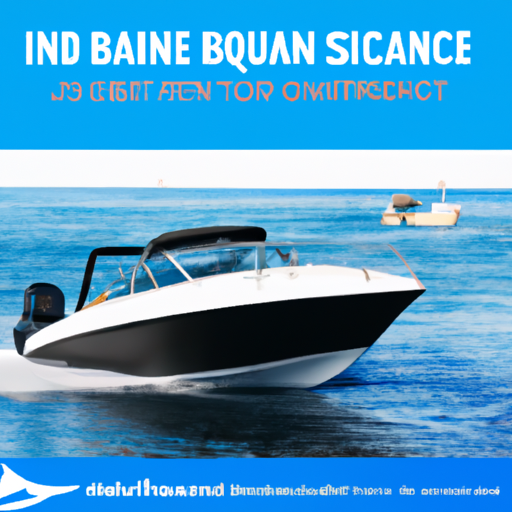Are you a boat owner? If so, you probably understand the importance of having the right insurance coverage for your vessel. After all, accidents can happen, and you want to be prepared for any unexpected events that may occur out on the water. In this article, we’re going to dive into the topic of boat insurance and explore how you can find the best coverage for your beloved boat. So, whether you’re a seasoned boat owner or a newbie looking for your first policy, keep reading to learn more about the ins and outs of boat insurance.
When it comes to finding the best boat insurance, there are a few key factors to consider. First and foremost, you’ll want to assess the value and size of your boat, as these are important factors that insurers take into account when determining your coverage and premiums. Additionally, you’ll want to consider what type of boating activities you engage in and if you need coverage for specific equipment, like fishing gear or water sports equipment. It’s also crucial to review the different coverage options available, such as liability coverage, comprehensive coverage, and uninsured boater coverage, to ensure that you have the protection you need.
Choosing the right boat insurance provider is just as important as selecting the right coverage. Look for an insurer that specializes in boat insurance and has a strong reputation in the industry. You’ll want to consider their customer service track record, claims process, and overall customer satisfaction. Don’t forget to compare quotes from different insurers to make sure you’re getting the best deal on your policy. In the end, finding the best boat insurance requires a bit of research and comparison shopping, but the peace of mind it provides is well worth the effort.

Understanding Boat Insurance
What is boat insurance?
Boat insurance, also known as watercraft insurance, is a type of coverage designed to protect boat owners from financial loss in the event of damage, theft, or accidents involving their boats. It provides coverage for a wide range of watercraft, including motorboats, sailboats, fishing boats, yachts, and personal watercraft.
Why is boat insurance important?
Boat insurance is important for several reasons. Firstly, it helps protect your investment in the boat itself. Boats can be quite expensive, and repairing or replacing a damaged or stolen boat can be financially devastating without insurance.
Secondly, boat insurance provides liability protection. If your boat causes accidental damage to someone else’s property or injures another person, you may be held legally responsible. Boat insurance can cover the costs of legal defense and any damages you are liable for.
Lastly, boat insurance can also provide coverage for personal property on the boat, such as fishing gear, water sports equipment, and other belongings. This coverage can help replace or repair these items if they are lost, stolen, or damaged.
Types of boat insurance coverage
There are several types of boat insurance coverage that you can choose from, depending on your individual needs and the type of boat you own. The most common types of coverage include:
-
Liability coverage: This coverage pays for damages and injuries to others if you are at fault in an accident. It includes property damage liability and bodily injury liability.
-
Physical damage coverage: This coverage protects your boat against damage or loss caused by accidents, storms, fires, theft, and vandalism. It typically includes both comprehensive and collision coverage.
-
Personal property coverage: This coverage provides protection for your personal belongings that are onboard the boat, such as electronics, fishing equipment, and water sports gear.
-
Uninsured boater coverage: This coverage pays for your medical expenses and damages if you have an accident with a boater who doesn’t have insurance or doesn’t have enough insurance to cover your losses.
Choosing the Right Boat Insurance Provider
Factors to consider when selecting a boat insurance provider
When choosing a boat insurance provider, there are several factors you should consider. These include:
-
Experience and reputation: Look for an insurance provider with experience in the boat insurance industry and a good reputation for customer service.
-
Coverage options: Ensure that the insurance provider offers the specific types of coverage you need for your boat.
-
Financial stability: Check the financial stability of the insurance provider by looking at its ratings from independent rating agencies.
-
Claims process: Research the insurance provider’s claims process and make sure it is easy to file a claim and receive prompt payment.
Comparing boat insurance quotes
It’s important to compare quotes from different insurance providers to ensure you are getting the best coverage at the most competitive price. When comparing quotes, consider factors such as the coverage limits, deductibles, and any additional benefits or discounts offered by each provider.
Reading and understanding insurance policies
Before purchasing a boat insurance policy, it’s crucial to thoroughly read and understand the terms and conditions. Pay close attention to exclusions, limitations, and any additional requirements that may affect your coverage. If you have any questions or need clarification, don’t hesitate to reach out to the insurance provider for assistance.
Common Boat Insurance Coverage Options
Liability coverage
Liability coverage is one of the most important types of boat insurance coverage. It protects you against financial loss if you cause damage to someone else’s property or injure another person while operating your boat. This coverage can help pay for legal defense fees, settlements, and medical expenses.
Physical damage coverage
Physical damage coverage provides protection for your boat against accidental damage, theft, vandalism, and other perils. It typically includes comprehensive coverage, which pays for non-collision-related damages, and collision coverage, which pays for damages caused by colliding with another object or boat.
Personal property coverage
Personal property coverage helps protect your personal belongings that are onboard your boat, such as fishing equipment, water sports gear, and electronics. This coverage can reimburse you for the cost of repairing or replacing your belongings if they are lost, stolen, or damaged.
Uninsured boater coverage
Uninsured boater coverage is essential if you have an accident with a boater who doesn’t have insurance or doesn’t have enough insurance to cover your losses. It can help pay for your medical expenses and damages, ensuring that you are not left financially burdened due to someone else’s lack of insurance.
Additional Boat Insurance Considerations
Navigational limits and usage restrictions
When choosing a boat insurance policy, be aware of any navigational limits and usage restrictions. Some insurance policies may restrict where and how you can use your boat, such as excluding coverage for international waters or limiting coverage to specific geographic areas. Make sure the policy aligns with your intended use of the boat.
Agreed value vs. actual cash value
Boat insurance policies typically offer two options for calculating the value of your boat: agreed value or actual cash value. Agreed value coverage pays you the agreed-upon value of your boat in the event of a total loss, while actual cash value coverage pays you the depreciated value of your boat at the time of the loss. Consider your boat’s age, condition, and market value when choosing between these options.
Deductibles and out-of-pocket expenses
Check the deductibles and out-of-pocket expenses associated with the boat insurance policy. A deductible is the amount you will have to pay out of pocket before the insurance coverage kicks in. A higher deductible can lower your premiums but may result in higher costs if you need to file a claim.

Tips for Lowering Boat Insurance Premiums
Installing safety and security features
Installing safety and security features on your boat can help lower your insurance premiums. Examples of these features include GPS tracking systems, alarm systems, fire extinguishers, and safety equipment like life jackets and flares. Insurance providers often offer discounts for boats equipped with these safety measures.
Completing boat safety courses
Taking boat safety courses can not only help you become a more responsible and knowledgeable boat owner but can also lead to lower insurance premiums. Many insurance providers offer discounts to boat owners who have completed approved safety courses.
Bundling boat insurance with other policies
Consider bundling your boat insurance with other types of insurance, such as home or auto insurance, with the same provider. Many insurance companies offer multi-policy discounts, which can lead to significant savings on your overall insurance costs.
Claims Process and Boat Insurance
Reporting a claim
In the event of an accident, theft, or damage to your boat, it’s crucial to report the claim to your insurance provider as soon as possible. Most insurance companies have a specific claims hotline or online reporting system. Provide detailed information about the incident and any supporting documents to aid the claims process.
Documenting damages and losses
After reporting a claim, document the damages and losses thoroughly. Take photos or videos of the damage, gather any relevant receipts or repair estimates, and keep a detailed record of any expenses incurred as a result of the incident. This documentation will be essential when filing your insurance claim.
Working with an adjuster
Insurance companies often assign an adjuster to handle your claim. The adjuster will assess the damages, investigate the incident, and negotiate a settlement for your claim. It’s important to cooperate and provide any requested documentation or information to ensure a smooth claims process.
Understanding Exclusions and Limitations
Common exclusions in boat insurance policies
Boat insurance policies typically have exclusions that outline what is not covered. Common exclusions include normal wear and tear, damage from improper maintenance, intentional acts, racing, and certain high-risk activities. Be aware of these exclusions to avoid any surprises when filing a claim.
Coverage limitations and restrictions
Read your boat insurance policy carefully to understand any coverage limitations and restrictions. These may include navigational limits, usage restrictions, and limitations on the type of water bodies you can operate your boat in. It’s important to adhere to these limitations to ensure your coverage remains valid.
Coverage for Specialized Boats
Sailboat insurance
Sailboat insurance is specifically designed to meet the unique needs of sailboat owners. It provides coverage for the boat itself, liability protection, and coverage for personal property onboard. Sailboat insurance may also offer specialized coverage for equipment used in sailing, such as sails, masts, and rigging.
Fishing boat insurance
Fishing boat insurance is tailored to the needs of anglers and provides coverage for both the boat and fishing equipment. This coverage can protect you against theft, damage, and loss of fishing gear, as well as provide liability protection in case of accidents involving other boaters or damage to their property.
Yacht insurance
Yacht insurance is designed for larger, more expensive vessels. It provides comprehensive coverage for the yacht, liability protection, and coverage for personal property onboard. Yacht insurance may also offer coverage for crew members, emergency assistance, and extended navigation limits for long-distance cruising.
Boat Insurance for Different Water Bodies
Inland waterways
If you primarily operate your boat on inland waterways, such as lakes and rivers, your boat insurance policy should reflect this. Insurance providers offer coverage specifically tailored to the risks associated with inland water boating, which may include coverage for grounding, sinking, and damage from submerged objects.
Coastal waters
Boat insurance for coastal waters typically includes coverage for rougher seas, increased risk of storms, and the potential for damage from saltwater exposure. If you plan to take your boat into coastal waters, ensure that your insurance policy provides the appropriate coverage for these unique risks.
International waters
If you intend to navigate in international waters, it’s essential to verify that your boat insurance policy provides coverage outside your country of residence. Insurance coverage for international waters may have additional requirements, such as emergency evacuation coverage and compliance with local regulations.
Conclusion
Having comprehensive boat insurance is essential for protecting your investment and providing peace of mind while enjoying your time on the water. By understanding the different types of boat insurance coverage, selecting the right provider, and considering additional factors, you can ensure that you have the best boat insurance for your needs. Remember to review your policy regularly, make any necessary adjustments, and enjoy boating with the confidence that you are properly protected.
